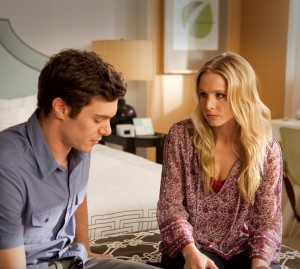‘Some Girl(s)’: A Provocative Look at a Soulless Man
Willfully chit-chatting with a slew of scorned exes would hardly be a top priority for most people, but then again, the unnamed protagonist (or antagonist, depending on how you perceive him) in Some Girl(s) isn’t like most people — at least not morally.
Adapted from a play by screenwriter Neil LaBute and directed by Daisy von Scherler Mayer, Some Girl(s) follows a self-involved 30-something college professor and writer (played by Adam Brody) who, before tying the knot, embarks on a redemptive, cross-country journey to seek forgiveness from five old flames and “right the wrongs” gnawing at his conscience. But as he learns, wanting forgiveness and deserving it are two very different things.
Having used the intimate details of his relationships with the women as direct inspiration for his renowned writing, these uninvited visits find them in less-than-welcoming moods. On his trip down memory lane, “Man” (as Brody is billed in the credits) reunites with Sam (Jennifer Morrison), the high school sweetheart he dumped before they made it to prom; Tyler (Mia Maestro), the tempting, uninhibited lover; Lindsay (Emily Watson), the older married woman he had a torrid affair with who gets some sweet revenge; Reggie (Zoe Kazan), his childhood best friend’s younger sister; and Bobbi (Kristen Bell), the closet thing he ever had to true love.
Quite possibly the most fascinating thing about this impressive group of women — whose romances with Man range from long-lasting to fleeting — is how they all represent vastly different intervals in his formative years. As he travels from Los Angeles to Boston, with a few stops in-between, their collective insight on his actions, transgressions and shortcomings paints a vivid portrait of his life. They are the last remnants of the time when he was a boy, a lover, a friend and a young man from which he pretends to have matured — making for an intriguing array of blasts from the (intentionally) forgotten past.
With a multitude of sins for which to repent, Brody’s Man is, not surprisingly, a tough character to invest in, especially when the audience is bound to share a singular desire to see each of these women deliver one good slap across his smug face (and one actually does). His vain notion that digging up the past will ease his own guilt is troublingly careless and leaves the women in emotional distress. He appears to live on the purposeful delusion that he is not the common factor in all of these failed attempts at happiness. As such, it is irritatingly fascinating to watch as he navigates his own ego in his apologies to the women, fessing up to only what he can bare and omitting the rest. As the women put him in his place, he becomes satisfyingly (for the audience at least) agitated and crimpled, forced to pull the wool from over his eyes.
Utilizing that boyish smile that made him famous on The O.C., Brody radiates the clever balance of charming and pompous needed to quietly manage the audience’s expectations for the moment when his charismatic, yet feeble façade finally comes crumbling down. By the time his true (and darker) colors come out, Brody has already skillfully prepared us so that we don’t feel shocked or cheated like the women before us experienced.
Most notable of the talented group of women is Kazan and her portrayal of Reggie, a new character written specifically for the film. At first, she seems to be no more than a ditzy girl who still clings to her childish crush on Man. But as their conversation progresses and intensifies, Kazan delicately morphs Reggie into an empowered young woman who, for her own sake and sanity, forcibly confronts him about a scarring incident between the two when she was a preteen. As Kazan holds back tears and recounts the loss of her innocence at an otherwise harmless party, the film reaches its emotional apex. Kazan incredibly transforms Reggie to a recognizable degree in her short segment of the film, setting the bar high, not only for Brody, but also for the other women.
In capturing Man’s artificial enlightenment, director Von Scherler Mayer chooses to maintain the confined stage presence of the story’s live theater roots — setting each encounter within a swanky hotel room. This stylistic choice proves adequate for bottling LaBute’s dialogue that fluctuates from snappy to funny, to intense, to misogynistic, but ultimately feels limiting and quite repetitive. It also elicits a rather sleazy feeling that each of the women are there to serve Man’s needs and deserve nothing more than being quarantined to an isolated existence in his eyes.
Most of Some Girl(s)’s faults come from the fatigue of having to wade through the murky motivations of a leading man that appears to lose a piece of his already-lacking soul with every stop along the way. Investment in a character is an obvious and essential ingredient for a character-driven piece to resonate with audiences. Brody and his female counterparts are undoubtedly fine actors who make the most of their respective stories. But when the anchoring factor in those stories is the unflatteringly egotistical Man (whose general name holds connotations for the gender as a whole), it takes dedication to sit through one of his convoluted reunions, let alone five.
Rating: 2.5 out of 4 stars
“Some Girl(s)” opened in select theaters on June 28 as well as on Vimeo on Demand for $5 for a viewing period of one week.
Trailer courtesy of somegirlsfilm.com.
Featured image: Adam Brody and Kirsten Bell star in “Some Girl(s).” Photo Credit: Leeden Media.











